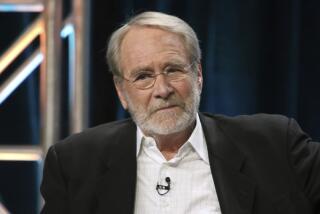Clone Scientist’s Speech Spawns Excitement
- Share via
BETHESDA, Md. — Scientists typically behave with cool, professional detachment. They are cautious, deliberate, unflappable. But not on Thursday.
On Thursday, it was standing-room-only inside an auditorium on the sprawling National Institutes of Health campus here. People started showing up at 7:30 a.m. to secure seats for an 11 a.m. lecture.
The object of their attention was one of their own: Dr. Ian Wilmut, the British scientist who created a cloned sheep named Dolly and who still seems bemused and befuddled by all the excitement the research evoked.
“Even scientists like celebrities,” explained Dr. Florence Haseltine, director of the center for population research of the National Institute of Child Health and Human Development and one of nearly 1,000 people who came early in the hopes of hearing Wilmut.
“I’m so happy to have an opportunity to introduce our guest speaker,” said Nobel laureate Harold E. Varmus, the NIH director. “It provided some assurance that I would have a seat.”
The invitation to Wilmut was extended months ago by the molecular embryology lab of the child health institute, whose members are passionately interested in reproductive science and--more specifically--in so-called nuclear transfer technology, the essence of Wilmut’s work. The idea was to get Wilmut together with a group of scientists in a conference room for a small, intimate seminar.
But that was before Wilmut and his colleagues at Edinburgh’s Roslin Institute in Scotland achieved the unthinkable. As a result, the once-small seminar exploded into a packed lecture, with NIH scientists spilling out of one packed auditorium--with its 500-seat capacity--into four overflow halls that filled rapidly.
Those who could not get into the main auditorium were turned away by several stern-faced NIH security police officers, but they got to see and hear Wilmut on a closed-circuit video screen in the other halls.
His audience ranged from the bench scientists who spend endless hours toiling in the labs--and whose names are largely unknown to the public--to the prestigious heads of the NIH’s individual institutes who often make headlines of their own.
Among the latter were Dr. Richard D. Klausner, director of the National Cancer Institute, and Dr. Anthony S. Fauci, one of the country’s leading AIDS researchers, who is director of the National Institute of Allergy and Infectious Diseases.
Wilmut’s stunning achievement “has fired the imagination at every level you can think of,” said Dr. Michael McClure, chief of the child health institute’s reproductive sciences branch, who was among those lucky enough to get into the main auditorium.
Before Dolly, the idea of cloning anything “was all ‘Star Trek’--something you’d see in a film,” McClure said. “Now, all of a sudden, you can’t deny it anymore.”
For his part, Wilmut, the star attraction Wednesday at a Senate hearing on the ethical issues raised by his work, appeared delighted to have an opportunity, finally, to talk basic science--rather than science fiction--with his peers.
He described in painstaking technical detail how he reached the point of Dolly’s birth, stressing that she represented one success out of 277 attempts. He made only one brief reference to the media hoopla--and only in discussing Dolly’s continuing progress.
“When I left Edinburgh last Friday, she was still healthy and well,” he said, “and, like me, struggling to cope with the TV cameras.”
About the same time the NIH scientists were crowding in to hear Wilmut, a bioethics advisory panel convened by President Clinton was beginning its work in a downtown Washington hotel. In coming months, the committee will struggle with the dilemmas posed by cloning research, particularly its potential application in humans.
Clinton, who recently imposed a moratorium on human cloning research, asked the committee to provide advice on some of these volatile issues.
Panel chairman Harold Shapiro, president of Princeton University, said its members hope to report back to Clinton in a timely fashion but predicted that cloning will be debated for years to come.
“I think like all great moral issues, there is no permanent consensus,” he said. “Society can just reach a temporary resolution that seems to make sense in their times for their feelings.”





